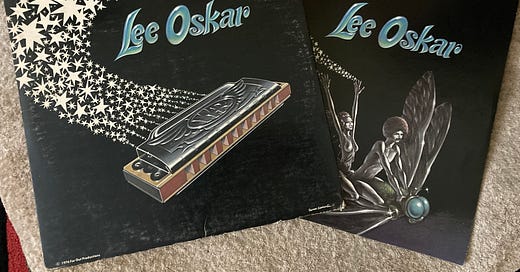Lee Oskar's Harmonica Journey: From War to Solo Mastery
Exploring the evocative power of Lee Oskar's debut and the journey that brought it to life.
I was just 20 and a Music Director at KACI, a small-town AM Top 40 radio station in The Dalles, Oregon. It was my first job, and one day, a new co-worker told me that as MD, I was supposed to take new albums home so I could listen to them in my spare time and decide if they should ever be added to the station’s playlist. Frankly, it was an idea I embraced.
One of the albums that followed me home was by a harmonica player, Lee Oskar. The fact that he played the harmonica was impossible to miss. Check out the cover:
After listening to it with my roommate, Jack, one night, it became a steady play on our turntable. How could it not? It was a nice rock, not too hard or soft, and it had beautiful songs. Side one of the album started with an intriguing opening: the sounds of footsteps, then a door knock, then a light harmonica with a string background before it picked up speed with a light background.
It was a musical journey, and the album captured the time and place for me that has stuck with me through the years. Music has a unique way of transporting you back to a time and place where old, long-gone friends come back to life, and the sights, smells and memories of that time seem real again.
Lee Oskar’s first album has always done that for me. It’s wistful, and if I might use the word, it fills me with ennui for that era of my life. I was young, naïve, immature, yet fully alive, embracing every living moment.
Lee Oskar was born in Copenhagen, Denmark, in 1948, and at six, a family friend gave him a harmonica. He was hooked. His story took on a movie-like path when, at 17, citing Ray Charles as one of his big influences, he decided that music was the path he needed to follow and moved to the US to pursue his musical dream. He arrived in NYC with little more than a harmonica in his pocket. He busked in the streets of the city, playing his harmonica for passersby, moving from NYC to Toronto and San Francisco, and finally arriving in Los Angeles, where he connected with Eric Burdon, who had recently disbanded The Animals.
Oskar and Burdon made the rounds of the LA clubs, eventually hooking up with the members of what would become the band War. Oskar was intrigued by the idea of forming a horn section with Charles Miller on saxophone, and it opened the door to elegant improvisation and hit-making as he played with the band for the next 24 years, garnering numerous accolades and several hit singles. Of course, it didn’t hurt the band that the first single they released was with Eric Burdon, “Spill the Wine,” which went to Number One in the US and top ten in several other countries.
Oskar also released several solo albums, with Lee Oskar in 1976 being the first, followed by albums in 1978, 1980, 1997, 2021, and 2023.
While I usually put together an extensive playlist when I feature a performer on this platform, today, I’m just going to post a playlist that is Lee’s first album from start to finish. I’d invite you to check out his other solo work, pull up some War and listen again.
I think you’ll dig it.






